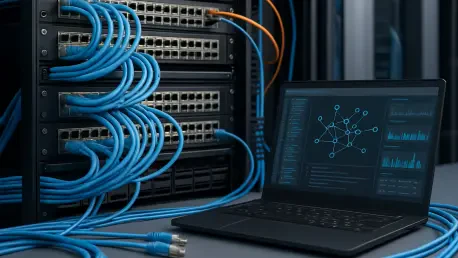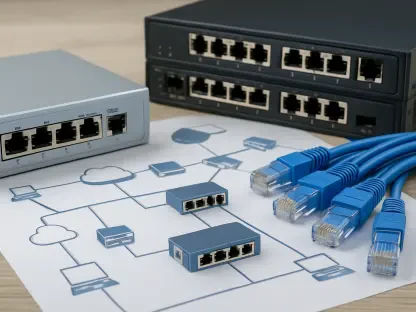In an era where seamless connectivity is the backbone of both personal and professional life, the LAN Cable Tester Market is emerging as a critical segment within the networking and telecommunications industry. These specialized devices, designed to verify the integrity and functionality of network cables, are becoming indispensable as businesses and households alike strive to minimize downtime and ensure reliable data transmission. With the digital landscape expanding at an unprecedented pace, the demand for tools that maintain network performance has never been higher. The market is on a robust growth path, projected to climb from a valuation of $693.4 million in 2025 to an impressive $1,200 million by 2035, reflecting a steady compound annual growth rate (CAGR) of 5.6%. This upward trajectory underscores the increasing complexity of modern network infrastructure and the vital role that testing equipment plays in supporting it. As technology continues to evolve, this market stands at the forefront of enabling a connected world, promising significant opportunities for innovation and expansion.
Forces Fueling Market Growth
The remarkable growth of the LAN Cable Tester Market is primarily driven by the global surge in IT and telecommunications infrastructure development. As organizations across industries undergo digital transformation, substantial investments are being made in network systems to support high-speed, reliable connectivity. This creates a pressing need for testing tools that can ensure performance and prevent costly interruptions. The expansion of data centers, driven by the rise of cloud computing and big data, further amplifies this demand, as even minor cable faults can lead to significant operational setbacks. Beyond corporate environments, the growing adoption of smart technologies in homes and offices, coupled with the proliferation of Internet of Things (IoT) devices, is pushing the need for testers into residential spaces. These tools are no longer just for IT professionals but are becoming essential for everyday users seeking to maintain their connected ecosystems, highlighting the broadening scope of the market’s relevance.
Technological innovation stands as another powerful catalyst propelling this market forward. Modern LAN cable testers are evolving beyond basic functionality, incorporating advanced features such as digital interfaces, automatic fault detection, and integration with mobile applications for remote monitoring. These enhancements not only improve accuracy but also make the devices more accessible to a diverse user base, from hobbyists to enterprise technicians. The advent of 5G technology and the increasing reliance on cloud-based solutions are adding layers of complexity to network systems, necessitating cutting-edge testing equipment capable of handling sophisticated demands. As a result, manufacturers are focusing on developing testers that offer comprehensive diagnostics and user-friendly experiences, positioning the market for sustained growth. This intersection of technological progress and rising connectivity needs paints a promising picture for the industry’s future, as it adapts to meet the challenges of an ever-connected world.
Diverse Applications and Market Segments
The LAN Cable Tester Market is characterized by its diversity, with product offerings tailored to a wide range of needs and applications. Testers are categorized into basic continuity models for simple checks, multifunctional devices for detailed diagnostics, and high-end network analyzers designed for complex enterprise environments. This segmentation ensures that solutions are available for everyone, from individual homeowners troubleshooting personal networks to large corporations managing vast IT infrastructures. The primary applications span across IT and telecommunications, data centers, educational institutions, government facilities, and residential settings. Among these, the IT and telecom sector dominates due to its continuous need for network optimization and reliability, driven by the critical nature of uninterrupted connectivity in business operations. This variety in product types and use cases reflects the market’s adaptability to evolving technological landscapes.
Geographic dynamics also play a significant role in shaping the market’s structure and growth patterns. North America holds a leading position, thanks to its early adoption of advanced networking technologies and the presence of major industry players driving innovation. Meanwhile, Europe maintains a strong foothold with its well-established industrial and commercial network infrastructure. However, the Asia-Pacific region is emerging as the fastest-growing market, fueled by rapid urbanization, increasing IT investments, and the rise of small and medium enterprises adopting digital solutions. Other areas, such as the Middle East, show untapped potential for expansion, though they currently receive less focus. This regional variation highlights the global nature of the market, with each area contributing uniquely to its overall trajectory. As connectivity becomes a universal priority, the demand for LAN cable testers is expected to rise across all regions, each with its distinct drivers and opportunities for growth.
Challenges Hindering Widespread Adoption
Despite the optimistic outlook, the LAN Cable Tester Market faces several obstacles that could impede its broader adoption. One of the most significant barriers is the high cost associated with advanced testing equipment, which often puts these tools out of reach for small businesses or budget-constrained projects. While basic testers are more affordable, they lack the sophisticated features needed for complex networks, forcing users to weigh cost against functionality. This financial challenge is particularly pronounced in emerging markets where economic constraints limit investment in high-end technology. Manufacturers face the task of balancing innovation with affordability to cater to a wider audience, ensuring that quality testing solutions are accessible without prohibitive price tags. Addressing this issue will be crucial for unlocking growth in cost-sensitive regions and sectors.
Another pressing concern is the proliferation of counterfeit products flooding the market, which undermines trust in testing outcomes. These low-cost, substandard alternatives often fail to deliver accurate results, potentially leading to network failures and safety risks. This issue not only affects end users but also poses a challenge for legitimate manufacturers striving to maintain brand integrity and customer confidence. Additionally, the technical complexity of operating advanced testers creates a hurdle, especially in regions or industries with limited access to skilled personnel. Training requirements and the need for specialized knowledge can deter adoption, particularly among non-professional users or small-scale operations. Overcoming these challenges will require a concerted effort from industry stakeholders to enhance product reliability, improve user education, and develop intuitive designs that lower the entry barrier for effective use.
Future Trends and Technological Horizons
Looking ahead, the integration of smart technologies is poised to redefine the LAN Cable Tester Market, ushering in a new era of efficiency and accessibility. Innovations such as AI-driven diagnostics and IoT-enabled devices are transforming testers into comprehensive network management solutions. These advancements allow for automated fault detection and real-time monitoring, often accessible via cloud-based platforms, enabling technicians to manage networks remotely with unprecedented ease. Such developments are particularly significant as network complexity increases with the rollout of 5G technology, which demands precise and reliable testing tools to support faster, denser connectivity. As these smart features become more mainstream, they are expected to broaden the appeal of testers, making them indispensable across various sectors and user groups, from large enterprises to individual consumers.
The expansion of data centers, fueled by the growing reliance on cloud computing, presents another key trend shaping the market’s future. With data loads increasing exponentially, the need for robust testing solutions to prevent downtime and ensure operational efficiency has never been greater. This trend is complemented by the rising adoption of smart environments in both residential and commercial spaces, where reliable network setups are critical for seamless functionality. Companies that prioritize the development of testers with cloud integration and user-friendly interfaces are likely to gain a competitive edge in meeting these evolving demands. Furthermore, as sustainability becomes a global focus, there may be a push toward energy-efficient testing devices, aligning with broader environmental goals. The convergence of these technological and societal shifts signals a dynamic future for the market, ripe with potential for innovation and growth.
Strategic Opportunities for Industry Players
For companies operating in the LAN Cable Tester Market, the path to success lies in addressing affordability and accessibility, particularly in emerging regions like Asia-Pacific where growth potential is immense. Developing cost-effective solutions without compromising on quality could open doors to untapped markets, especially among small and medium enterprises eager to adopt network technologies. Strategic partnerships with network infrastructure providers can also play a pivotal role, enabling manufacturers to integrate their testing solutions into broader connectivity ecosystems. By aligning with key players in the telecommunications space, companies can enhance their market presence and offer bundled services that appeal to large-scale clients. This collaborative approach not only boosts visibility but also fosters trust among end users seeking reliable, integrated solutions.
Beyond partnerships, a strong emphasis on customer support and education will be essential in differentiating brands in a competitive landscape. Offering comprehensive training programs and intuitive product designs can help bridge the technical skill gap, making testers more approachable for non-expert users. Additionally, focusing on innovation—such as incorporating AI and remote monitoring capabilities—will position companies to meet future network demands driven by technologies like 5G and IoT. Emerging markets present a unique opportunity for expansion, provided manufacturers can navigate cost barriers and localize their offerings to suit regional needs. As the global demand for connectivity continues to soar, the market offers fertile ground for forward-thinking players to innovate, adapt, and capture significant market share through strategic positioning and customer-centric approaches.
Reflecting on Market Potential and Next Steps
Reflecting on the journey of the LAN Cable Tester Market, it has become clear that this niche yet vital segment has played a pivotal role in supporting the global push for seamless connectivity over the past decade. The market has demonstrated resilience and adaptability, growing steadily amidst technological shifts and rising network demands. Challenges such as high costs and technical barriers have been met with innovative responses, while regional disparities highlight both mature markets and untapped opportunities. The consistent CAGR of 5.6% from 2025 onward underscores a sustained interest in reliable testing solutions, cementing the market’s importance within the broader telecommunications landscape.
Moving forward, industry stakeholders should prioritize actionable strategies to sustain this momentum. Developing affordable, user-friendly testers will be key to penetrating emerging markets, while continued investment in smart technologies like AI and cloud integration can address future network complexities. Collaboration with educational institutions to build technical expertise among users could also mitigate adoption barriers. As connectivity remains a cornerstone of modern life, focusing on innovation and accessibility will ensure that the market not only meets past expectations but also shapes a more connected future.









